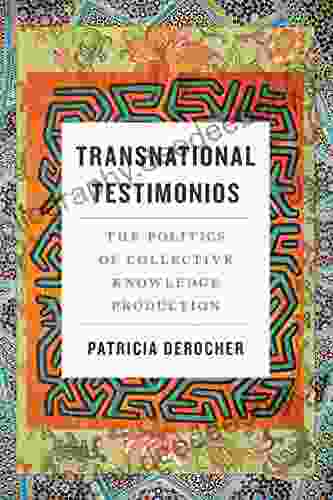The Politics of Collective Knowledge Production: Decolonizing Feminisms

4 out of 5
| Language | : | English |
| File size | : | 1524 KB |
| Text-to-Speech | : | Enabled |
| Screen Reader | : | Supported |
| Enhanced typesetting | : | Enabled |
| Word Wise | : | Enabled |
| Print length | : | 266 pages |
Feminist scholars have long argued that knowledge is not neutral or objective, but rather is shaped by the social and political context in which it is produced. This is particularly true for knowledge about women and gender, which has been historically dominated by the voices of white, Western men.
In recent years, there has been a growing movement to decolonize feminisms, which seeks to challenge the ways in which Western knowledge systems have marginalized and silenced the voices of women from the Global South and other marginalized groups.
One of the key aspects of decolonizing feminisms is the recognition that knowledge is not something that can be simply extracted from the world and transmitted to others. Rather, knowledge is a process that is created through collective engagement and dialogue.
This means that the ways in which we produce knowledge are just as important as the knowledge itself. If we want to create more inclusive and equitable knowledge systems, we need to create spaces where all voices are welcome and where everyone has the opportunity to participate in the process of knowledge production.
There are a number of ways to do this. One important step is to create more inclusive research methodologies. This means involving marginalized communities in the research process from the very beginning, and using methods that are sensitive to their experiences and perspectives.
Another important step is to create more diverse and inclusive academic institutions. This means hiring more faculty from marginalized backgrounds, and creating spaces where students from all backgrounds feel welcome and supported.
Finally, it is important to challenge the ways in which knowledge is disseminated and used. We need to create more open and accessible channels for knowledge sharing, and we need to be critical of the ways in which knowledge is used to justify oppression and inequality.
Decolonizing feminisms is a complex and ongoing process, but it is essential for creating more inclusive and equitable knowledge systems. By challenging the ways in which knowledge has been historically produced and disseminated, we can create a more just and equitable world for all.
Examples of Collective Knowledge Production in Decolonizing Feminisms
There are many examples of collective knowledge production in decolonizing feminisms. Here are a few:
- The Combahee River Collective was a group of Black feminist lesbians who came together in the 1970s to create a new political agenda for Black women. The collective developed a theory of "identity politics" that recognized the multiple and intersecting oppressions faced by Black women. Their work has been hugely influential in the development of Black feminism and other decolonizing feminisms.
- The Third World Women's Alliance is a global network of women's organizations working to promote the rights of women in the Global South. The alliance provides a platform for women from different regions to share their experiences and perspectives, and to develop collective strategies for change.
- The Indigenous Women's Network is a network of Indigenous women from around the world working to promote the rights of Indigenous women. The network provides a space for Indigenous women to share their experiences and perspectives, and to develop collective strategies for change.
These are just a few examples of the many ways in which women from marginalized backgrounds are coming together to create new knowledge and challenge the status quo. By sharing their experiences and perspectives, and by working together to develop collective strategies for change, these women are creating a more just and equitable world for all.
The politics of collective knowledge production is central to decolonizing feminisms. By challenging the ways in which knowledge has been historically produced and disseminated, we can create more inclusive and equitable knowledge systems. This is essential for creating a more just and equitable world for all.
4 out of 5
| Language | : | English |
| File size | : | 1524 KB |
| Text-to-Speech | : | Enabled |
| Screen Reader | : | Supported |
| Enhanced typesetting | : | Enabled |
| Word Wise | : | Enabled |
| Print length | : | 266 pages |
Do you want to contribute by writing guest posts on this blog?
Please contact us and send us a resume of previous articles that you have written.
 Novel
Novel Page
Page Chapter
Chapter Text
Text Story
Story Reader
Reader E-book
E-book Magazine
Magazine Newspaper
Newspaper Sentence
Sentence Glossary
Glossary Bibliography
Bibliography Manuscript
Manuscript Codex
Codex Tome
Tome Classics
Classics Library card
Library card Biography
Biography Autobiography
Autobiography Memoir
Memoir Narrator
Narrator Character
Character Librarian
Librarian Card Catalog
Card Catalog Borrowing
Borrowing Archives
Archives Periodicals
Periodicals Study
Study Research
Research Lending
Lending Academic
Academic Journals
Journals Reading Room
Reading Room Interlibrary
Interlibrary Literacy
Literacy Study Group
Study Group Thesis
Thesis Storytelling
Storytelling Book Club
Book Club Theory
Theory Linda Killen
Linda Killen Gareth P Jones
Gareth P Jones Thomas Johnson
Thomas Johnson Jenny Holiday
Jenny Holiday Meredith Colby
Meredith Colby Graham Moore
Graham Moore Serena Faber Nelson
Serena Faber Nelson Matt Pentz
Matt Pentz Gary Northfield
Gary Northfield Tim Fitzgerald
Tim Fitzgerald Karen Sandler
Karen Sandler Susan Elkin
Susan Elkin Catherine Ryan Howard
Catherine Ryan Howard J Bronson
J Bronson Eileen S Prince
Eileen S Prince Ruth Reichl
Ruth Reichl Colley Hwang
Colley Hwang Timothy Remus
Timothy Remus Dave Connis
Dave Connis Simon Stephens
Simon Stephens
Light bulbAdvertise smarter! Our strategic ad space ensures maximum exposure. Reserve your spot today!
 Dion ReedFollow ·11.9k
Dion ReedFollow ·11.9k Damon HayesFollow ·11.9k
Damon HayesFollow ·11.9k Joseph ConradFollow ·3.9k
Joseph ConradFollow ·3.9k Larry ReedFollow ·17.7k
Larry ReedFollow ·17.7k Walter SimmonsFollow ·15.9k
Walter SimmonsFollow ·15.9k Federico García LorcaFollow ·17.7k
Federico García LorcaFollow ·17.7k Ivan TurnerFollow ·9.8k
Ivan TurnerFollow ·9.8k Jeffrey CoxFollow ·6.8k
Jeffrey CoxFollow ·6.8k

 Braden Ward
Braden WardFeminism's Forgotten Fight: The Ongoing Battle for...
The feminist movement has historically...

 Julio Cortázar
Julio CortázarBlue Heaven Black Night: A Literary Journey Through Love,...
In the realm of...

 Eddie Bell
Eddie BellA Journey Through Time: Exploring the Enchanting World of...
The vibrant tapestry of New...

 Lawrence Bell
Lawrence BellValiance Dragon Soul Press Anthology: A Literary Odyssey...
Step into a realm where...

 Aron Cox
Aron CoxEmbark on a Creative Odyssey with Jean Leinhauser's "101...
Unveil a Kaleidoscope of...
4 out of 5
| Language | : | English |
| File size | : | 1524 KB |
| Text-to-Speech | : | Enabled |
| Screen Reader | : | Supported |
| Enhanced typesetting | : | Enabled |
| Word Wise | : | Enabled |
| Print length | : | 266 pages |














